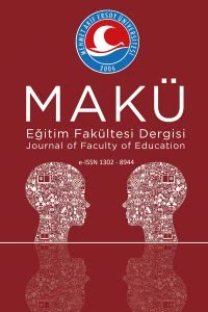İlköğretim 6. Sınıf Öğrencilerinin Geometri Öz-Yeterliklerinin Akademik Başarı Not Ortalamaları İle İlişkisi
Araştırmada, ilköğretim 6. sınıf öğrencilerinin geometri öz-yeterliklerinde cinsiyete göre farklılaşma olup olmadığının ve geometri öz-yeterlikleri ile akademik başarıları arasındaki ilişkinin belirlenmesi hedeflenmiştir. Araştırma, tarama modeli ile yürütülmüştür. Araştırma problemi doğrultusunda bu çalışma, İstanbul ili devlet okullarındaki 6. sınıfta öğrenim görmekte olan 120 öğrenci ile gerçekleştirilmiştir. Araştırma verileri, Cantürk-Günhan ve Başer'in(2007) geliştirmiş oldukları Geometri Öz-yeterlik Ölçeği ve araştırmacılar tarafından oluşturulmuş olan kişisel bilgi formu ile toplanmıştır. Araştırma verileri SPSS 16 paket programıyla analiz edilmiştir. Verilerin çözümlenmesinde t-testi, Tek yönlü varyans analizi (ANOVA) istatistiksel yöntemleri kullanılmıştır. Bulgular sonucunda, ilköğretim 6. sınıf öğrencilerinin geometri öz-yeterliklerinde cinsiyet değişkenine göre anlamlı bir farklılık olmadığı tespit edilmiştir.Araştırma grubundaki ilköğretim 6. sınıf öğrencilerinin geometri öz-yeterliklerinin;Matematik, Fen ve Teknoloji, Türkçe, Sosyal Bilgiler, Müzik ve İngilizce dersi başarı notları ile ilişkili olduğu görülmüştür. Araştırma bulguları doğrultusunda öneriler sunulmuştur.
Anahtar Kelimeler:
Geometri öz-yeterlik, Akademik başarı, İlköğretim öğrencileri
The Relation Between 6th Grade Elementary School Students Self-Efficacy Beliefs and Academic Achievement in Geometry
This is a survey study, which aims to indicate that whether there is a gender difference in geometry self- efficacy of 6th grade students or not; and to determine the correlation between geometry self- efficacy and academic achievement of 6th grade students. It is applied to 120 students which are studying in 6th grade in Istanbul city center. The data were collected through the Geometry Self-Efficacy Scale improved by Cantürk-Günhan and Başer(2007) and demographic information form designed by the researchers. Statistical analysis was performed by using SPSS 16 Statistical Package Program. For data analysis, t-test and one-way ANOVA methods were used. According to the findings; it was determined that there is no significant difference in geometry self- efficacy of 6th grade students according to gender variable. It was found that the geometry self- efficacy of the 6th grade students in research group was related with academic achievement grades of the following courses; Mathematics, Science and Technology, Social Studies, Music, and English. Several suggestions were made according to research findings.
- ISSN: 1302-8944
- Yayın Aralığı: Yılda 4 Sayı
- Başlangıç: 2007
- Yayıncı: BURDUR MEHMET AKİF ERSOY ÜNİVERSİTESİ
Sayıdaki Diğer Makaleler
Nörolojik Etki Yönteminin Öğrencilerin Akıcı Okuma ve Anlama Becerilerine Etkisi
DİLEK ERDURAN AVCI, Nazmiye Şadiye ÖNAL
Biyoloji Öğretmen Adaylarının Çevre Bilinci ve Çevresel Duyarlılığı: Ölçek Geliştirme Çalışması
Selami YEŞİLYURT, Şeyda GÜL, Yavuz DEMİR
İlköğretim Öğrencilerinin Coğrafya Biliminin Konularına İlişkin Algıları
Türkiye’deki Cumhuriyet Dönemi İlköğretim Matematik Programlarına Genel Bir Bakış
Fen Bilgisi Öğretmenliği Öğrencilerine Göre; Neden Matematik? Nasıl Matematik?
Çocuklarda Merak Duygusunu Uyandırmada Montessori Öğretmenlerinin Kullandıkları Stratejiler
